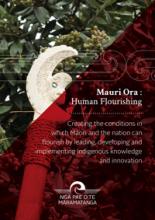E kore e ngaro nga tapuwae i nga wa o mua,
He arahina ke tatou ki te huarahi nei,
Me hangaia e tatou e tatou ano
We can never erase the footprints of our past,
They lead us to the paths of the future
We carve for ourselves.
In the 21st century, indigenous youth face an uncertain and challenging future. In the years ahead they will need to deal with a daunting range of issues, some of potentially unprecedented scale and scope.
These include, for example, the impact of climate change and associated environmental damage and social dislocation; global economic crises; food and water insecurity; high youth suicide rates; rising levels of child poverty and preventable poverty-related diseases; interpersonal violence, armed conflict, and cultural and religious warfare between peoples and nations; and, many other problems linked to over-population and consumption.
At the same time, everyday life for many young Māori in the present carries its own tensions and challenges. For example:
- Approximately one-third of young Māori currently live in income poverty (twice the proportion of young Pākehā) (Kawharu, 2015)
- Māori youth suicide rates are 2.4 times higher than for non-Māori youth (New Zealand Ministry of Health, 2015)
- Māori young people have high unemployment rates and are more likely to be unemployed than non-Māori youth (Te Pou o te Whakaaro Nui, 2015)
- Māori have a higher rate of incarceration than any other ethnic group on New Zealand (Statistics New Zealand, 2012) and report lower levels of life satisfaction than other population groups (Statistics New Zealand, 2015)
- In the education domain, young Māori have a lower rate of NCEA attainment than non-Māori (New Zealand Ministry of Education, 2015).
Over time, successive governments have introduced interventions at every level but with limited success.
This study is premised on the understanding that despite formidable challenges, as Māori young people grow into adulthood, they will be called upon to develop problem-solving strategies that are responsive to the unique needs and priorities of their communities. We take a strengths-based approach to identifying the ways that these young people can navigate the uncertainties ahead with confidence, poise and hope. The focus of this research is therefore on the power of Māori youth to determine what will work for them now and in the future to make a difference.
Through three inter-connected case studies, this project aims to engage young Māori who are currently in mid to late adolescence in a series of critical conversations about the future. In the first phase of the project, young people’s hopes and fears about the years ahead will be canvassed and a space will be provided for them to collectively articulate what an ‘ideal’ future might look like for their whānau, hapū and iwi. A methodological exercise known as “community asset mapping” (Delgado & Humm-Delgado, 2013) will also be conducted to ascertain what resources exist or need to be further developed in coming years. The second phase of the project involves a series of networked think tanks whereby groups of urban, rural and tribal Māori participants will share ideas and generate problem-solving approaches geared towards realizing the dream of a future where indigenous communities can flourish and thrive.
read more from the lead researcher on this project, Joanna Kidman, at https://inabrownstudy.nz/maori-youth-and-the-future/
